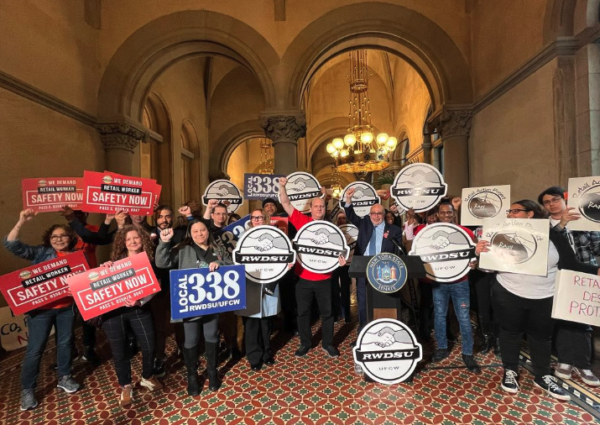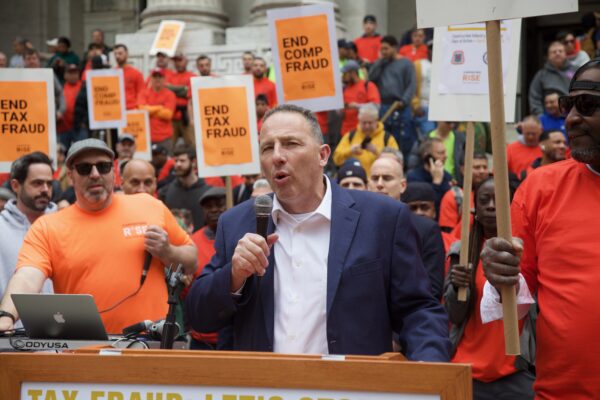July 17, 2012
By Marc Bussanich, LaborPress City Reporter
The re-elected President of the National Writers Union, Local 1981, Larry Goldbetter, spoke with LaborPress recently about the issues and struggles the Local is engaging in. With 1,300 members, the union represents freelance writers of all genres.
The union’s main struggle is to ensure that writers get paid, because although the shift from print to digital writing and journalism has allowed more publishers to publish, the contradiction is that there are many instances where writers aren’t getting paid.
For example, the union has been waging a three-year battle against publisher Inkwell Solutions, where 60 workers (writers, editors, graphic artists and translators) in New York were owed $360,000 for writing content for textbooks in the Texas school system. Unfortunately, the owners took the $360,000, closed shop and then split, making it very unlikely that the workers will see any of those earnings. The union is still working out the details for a judgement in federal court.
But Goldbetter noted that a big part of the legal case was to argue that the workers were really misclassified workers because in many respects they weren’t working as freelancers.
“The workers worked on company computers, they had to adhere to company work schedules and were supervised by four managers,” said Goldbetter.
According to Goldbetter, the New York State Department of Labor has a very good stand on the issue of misclassified employees, so by filing with the department, the union was able to have the owners held personally responsible.
“At a minimum, we were able to stop them from ripping off more people, and if the owners were to reopen another publishing business, the 60 workers would be the first in line to be paid,” Goldbetter said.
Two other fights include one with Natural Solutions, a magazine in the Twin Cities, and Heart and Soul magazine, which is almost exclusively written by and produced by black women on black women’s health. Goldbetter noted that the Twin Cities mag owes upwards of $25,000 to 15 freelancers of the NWU, while the Heart and Soul’s publisher owes 20 freelancers over $150,000 for work completed, published and sold.
“We already got $20,000 from the publisher, but we’re still waiting for the outstanding balance to be paid to the freelancers.”
These fights epitomize the landscape that freelance writers encounter daily as technological advancements have thoroughly toppled the dominance of print journalism.
“It’s amazing how many people are writing and not getting paid. The biggest contradiction the union is facing is that it’s easier than ever before to publish, but it’s harder than ever before to make a living at it,” Goldbetter noted.
One reason he gave for the dramatic shift from print to online journalism can be drawn from history.
“I think in general, anytime there have been significant developments in technology, the initial outcome has been for the new owners of that technology to reap tremendous benefits at the expense of workers.”
He likened the shift to digital to the introduction of mass production assembly lines.
“At first, autoworkers worked for next to nothing on the line. It took time for the workers to catch up and get organized. Under this system, the owners of the new technology use it to their advantage. If writers owned the technology, they could use it to develop writing, journalism, publishing and culture. But the owners organize it to make a fortune out of it for them.”
The union is also leading a long-term strategic campaign, Pay the Writer (paythewriter.org), which it launched soon after Arianna Huffington, the founder of the online news site Huffington Post, sold it to AOL for $315 million in February 2011! The focus of the campaign is to ensure that freelancers get paid for any content they produce for news sites and other online properties.
“The ultimate objective is to establish a pay standard for online journalism, similar to a minimum wage, although freelancers don’t get paid hourly wages. The motivation behind our boycott of HuffPo was that we believed that Arianna had the opportunity to do the right thing, but she instead decided to commit herself to doing the wrong thing. She could have set the standard by saying, ‘My freelancers deserve a minimum of a $1 per word.’ But she didn’t do that.”
According to Goldbetter, HuffPo pays its non-union newsroom staff, but it doesn’t pay its freelance writers, although the company now says it doesn’t hire freelance writers at all, which Goldbetter says is just not true.
Interestingly, Goldbetter and fellow NWU members had the opportunity to greet Ms. Huffington, who draws a $4 million salary as director of online content for AOL, when she was invited to speak at the National Women’s Law Center’s 40th birthday celebration on the Upper Westside. LP readers can see the encounter via http://vimeo.com/42020660.
“There are a lot of writers on the Upper Westside, so when they saw us standing outside with our banner, we got a tremendous response from people going to the event and people walking by,” said Goldbetter.
A $315 million sale of digital content and property is no chump change. “There’s plenty of money there, but the writers aren’t getting it, so that’s our apple,” Goldbetter said.
But he acknowledged the union faces an uphill battle to achieve the goals of the campaign because it requires a very big movement of writers, which is not easy.
“We need a bigger union than we have today. The campaign has to build a stronger union in order for it to win a pay standard. In order to do that, we have to really involve thousands of journalists who write everywhere to see what the lay of the land is.” marc@laborpress.org



